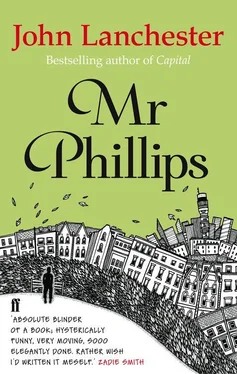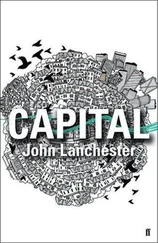Mr Phillips scans the Evening Standard quickly as the train bangs along. For him the etiquette of picking up a paper on a train is that you can read it on the train or other public place but you then have to leave it behind in your turn. Otherwise it is as if you have stolen it. So he doesn’t have long. Most of the news is the usual. On page seven however there is a story about a pair of mime artists who were taking part in the festival of street theatre that is going on in London for the next three days until they were arrested for outraging public decency. They had dressed up as a tramp and a schoolgirl and pretended to have sex together on an Underground train. Their mistake was to pick a carriage with an off-duty policeman in it. The crime carries a maximum sentence of twelve months.
The train roars through Vauxhall station without stopping and then a few minutes later begins to slow down as it approaches Clapham Junction. Various people begin to make This Is My Stop preparations. The man with the wine bottle starts gently wrapping the tissue paper back around his treasure. The girl beside him stops looking at her reflection and adjusts a plastic folder she is holding to her chest. With sadness Mr Phillips sees that the folder is a brochure from a modelling agency called Model Models. It is as if no pretty girl can just be a pretty girl any more, it has to be a job or an ambition.
Mr Phillips squeezes up and out of his seat and stands gripping the rail beside the compartment door. The metal has the slick coolness of an object that has been touched by many hands since it was last cleaned, and it is hard to suppress thoughts about flu germs, tropical viruses, people who don’t wash their hands after wiping their arses. Mr Phillips is not phobic or hypersensitive about these things but sometimes they cross his mind. The train stops, the doors make their noises and open, and Mr Phillips hops across the gap on to the platform.
Mr Phillips comes out on to the bleak rear entrance of the station, where he faces a few disconsolate and halfhearted tower blocks, many of them ex-council flats now sold into private ownership. There is also a depressed-looking dentist’s and a meeting house for Seventh Day Adventists, both of them made out of concrete and appearing as if they were designed to be used as places of defensive entrenchment in the event of war or major civil unrest.
Weaving in between these low buildings, Mr Phillips wonders if the bank robbery will have already been on the news when he gets home, or whether that sort of thing makes the news at all. On the three or four times he has passed what looked like horrific traffic accidents — once when policemen seemed to be shampooing, or at least hosing down, blood off the Cromwell Road after an accident between, of course, a white van and a motorbike — he always expected to be hearing about it in gory detail when he sat down with the telly, but never yet had, not once. These things must be too commonplace to be reported. Perhaps bank robberies and stick-ups were like that also, going on all the time as part of the normal background life of the city.
At the point where Mr Phillips emerges on to Kestrel Lane for the last five minutes of the walk home, he nearly bumps into an old woman who is carrying three or four plastic bags and is stooped over like a question mark from the effort. She is moving so slowly that she has turned herself into an obstacle. Mr Phillips swerves past her and heads onward, glad to have avoided a collision that would only have ended in his making apologies he didn’t believe. (Sorry, Mr Phillips will say, when someone treads on his foot.)
Mr Phillips doesn’t think much about what it would be like to be old, since he can’t imagine living longer than his father, who died at the age of sixty-one. Not that he thinks he is going to pop his clogs at any moment; but he just can’t picture it other than to entertain very vague mental images of himself at eighty dandling great-grandchildren, or effortfully blowing out a single tiny candle at his crowded ninetieth. He can however imagine that things just get worse and worse, and that the difficulties he has accumulated with his own body, the fatness and sweatiness and occasional out-of-breathness, his stiff morning back and pee-again prostate, his sour and reluctant-to-settle stomach acid, the sense that the face in the mirror was an unwelcome growth attached to his real face (which is thirty years younger); all these things would just get worse, so that he would be hugely fat, wheezing, barely able to walk, stooped, racked by arthritic pains, constantly peeing, chronically dyspeptic, ugly and malodorous, with in addition all the unexpected nastiness that would suddenly crop up, new diseases, a dodgy liver, dizzy spells, impetigo, insomnia, asthma, diverticulitis, any nasty surprise, basically, except Aids (chance would be a fine thing). All that is in store. The little old lady whom Mr Phillips has just overtaken looks as if she lives in a country where all these things are just part of an ordinary day.
Mr Phillips turns around and goes back towards her. In the time he has taken to go a hundred yards she has moved about twenty feet. As he walks up to the bent and wrapped figure he sees that she is alarmed by his approach. Frightened of me! Imagine!
‘Excuse me,’ says Mr Phillips, ‘can I help?’
She stops to listen. The woman’s expression says very clearly that the effort of stopping and starting and thinking the proposition over is not welcome. At the same time there is a shrewdness there, too. She is sizing up the likelihood that he will seize her bags and do a runner. She has, though, a nice face, a tiny bit whiskery but bright-eyed and open.
‘Can I help with your bags?’ Mr Phillips says.
She takes a moment to think this over and then without saying anything puts her bags down on the pavement, all four of them, though not her handbag, which she keeps over the crook of her arm. She has an unexpectedly good bending technique, flexing her knees rather than bending her back.
‘Thank you,’ says the woman, after she has put her bags down.
‘Are we going far?’
‘Over there,’ she says, pointing at the tower blocks that had once belonged to the council and now are a mix of public and private housing. Most of the new tenants are people like Martin, yuppies. This woman is one of the older generation of council tenants, the aboriginal inhabitants of this part of town, gradually being driven out by the influx of money.
‘Fine,’ says Mr Phillips. He picks up the bags, two in each hand, which with his briefcase makes five in all. The bags come from Asda, about ten minutes’ walk away for Mr Phillips and who knew how long for her. They are not light. She must wait for her pension and do all the week’s shopping in one go. Mr Phillips suspects that if he were in a similar position he would be inclined to do his shopping on a daily basis, popping out for a tin of baked beans and a loaf of bread one day, a pair of lamb chops and a baking potato the next — a daily trip or expedition.
‘I was getting a bit short of puff,’ the old woman says in a more confiding and cheery way.
‘It’s a big shop you’ve done,’ says Mr Phillips. She gives a small titter.
‘Monday is my day for them.’
‘My wife does all our shopping.’
‘You’re lucky.’
Am I? thinks Mr Phillips. They arrive at the barred gate to the block of flats. There is a little metal keypad where the old lady types in a four-digit entry code: 2146, Mr Phillips can’t help but notice. If people in the towers do the Lottery quite a few of them will probably use that same code, so if it ever comes up in the winning sequence there could be a mysterious rash of instant millionaires in the flats. The lift shafts would ring to the popping of champagne corks, the forecourts would suddenly become clogged with Bentley convertibles. The latch buzzes and the gate clicks open, the woman helping it swing wider by leaning on it with her shoulder. Mr Phillips squeezes through after her.
Читать дальше




![Unknown - [Carly Phillips] The Bachelor (The Chandler Brothe(Bookos.org) (1)](/books/174132/unknown-carly-phillips-the-bachelor-the-chandle-thumb.webp)







